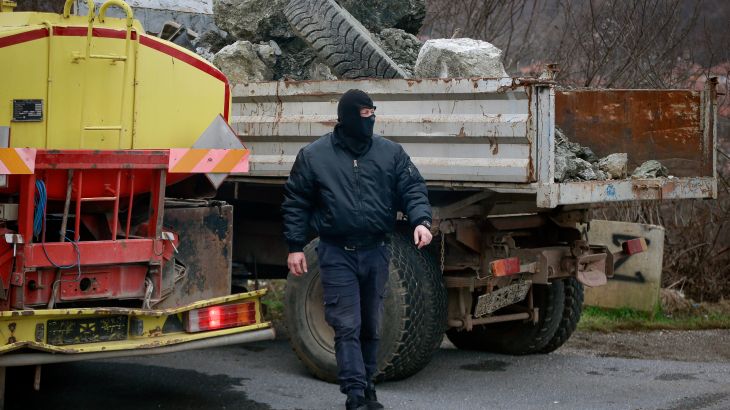Kosovo opens all border crossings as Serbs remove roadblocks
Ethnic tensions along Kosovo’s eastern border appear to be easing amid fears of an armed conflict.

All border crossings linking Kosovo to Serbia have reopened after ethnic Serbs removed roadblocks set up in protest over a policeman’s arrest, easing tensions in the volatile region.
The main crossing between the neighbours opened on Thursday after barricades were dismantled from the Serbian side of the Merdare border point. Kosovo police said two smaller border crossings “opened for traffic in the afternoon” on Friday.
Keep reading
list of 3 itemsEthnic Serbs erect more roadblocks as tensions soar in Kosovo
Kosovo minister sees Russian influence in growing Serbian tension
One barricade remained standing near the flashpoint city of Mitrovica, where two burnt trucks – the target of suspected arson – still blocked the road.
Tensions flared up on December 10 after ethnic Serbs in the north put up barricades to protest the arrest of a former policeman suspected of being involved in attacks against ethnic Albanian police officers.
After the roadblocks were set up, Kosovar police and international peacekeepers were attacked in several shooting incidents.
Serbian armed forces were put on heightened alert this week, sparking fears of an armed conflict in the tense Balkan region.
Dismantling the roadblocks
Tensions eased on Wednesday when a Pristina court ordered the release of the former police officer, whose arrest Serbs cited as the main reason for erecting the barricades.
Serbian President Aleksandar Vucic also urged Serbs to dismantle the roadblocks, following calls from the United States and the European Union for de-escalation.
On Thursday, the EU and NATO, the latter leading a peacekeeping force in Kosovo, hailed the removal of barricades.
“Diplomacy prevailed in de-escalating tensions in north Kosovo,” said EU foreign policy chief Josep Borrell.
“Violence can never be a solution,” he tweeted and stressed the need for “urgent progress” in the EU-facilitated dialogue between Belgrade and Pristina.
NATO also welcomed “efforts to de-escalate tensions in northern Kosovo”.
A volatile situation
North Kosovo has been on edge since November, when hundreds of ethnic Serbs police officers, mayors, judges and prosecutors collectively walked off their jobs.
They were protesting a controversial decision to ban Serbs living in Kosovo from using Belgrade-issued vehicle licence plates, a policy that was eventually scrapped by Pristina.
An attempt to fill the gap by deploying ethnic Albanian police officers to Serb-majority north only aggravated the tensions.
Kosovo declared independence from Serbia in 2008, after a bitter war in the late 1990s.
Belgrade does not recognise Pristina’s authority and encourages Kosovo’s 120,000 ethnic Serbs to defy its rules, especially in the north, where they hold a majority.